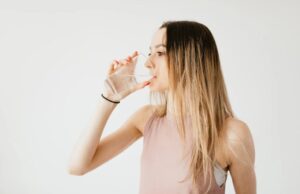 Staying well-hydrated is essential for overall health and supports various bodily functions, from digestion and energy levels to skin health and mental clarity. In the context of weight loss, drinking plenty of water plays a particularly powerful role. Water can naturally curb appetite, improve metabolism, and help eliminate toxins from the body. Additionally, many people mistake thirst for hunger, leading to unnecessary snacking and overeating. By making hydration a priority, you’ll not only feel better but also support your weight-loss and wellness goals.
Staying well-hydrated is essential for overall health and supports various bodily functions, from digestion and energy levels to skin health and mental clarity. In the context of weight loss, drinking plenty of water plays a particularly powerful role. Water can naturally curb appetite, improve metabolism, and help eliminate toxins from the body. Additionally, many people mistake thirst for hunger, leading to unnecessary snacking and overeating. By making hydration a priority, you’ll not only feel better but also support your weight-loss and wellness goals.
“Water is life’s original and most essential nutrient—hydration is at the core of every healthy body function.”
Why Drinking Water Matters
Water is involved in every system and function in our bodies. It helps regulate body temperature, transports nutrients, and facilitates digestion and absorption. When you’re adequately hydrated, your body works more efficiently, from breaking down food to producing energy.
Water also plays a role in reducing bloating by flushing out excess sodium and toxins. Proper hydration supports healthy kidney function, which in turn aids the body’s natural detoxification processes. Especially if you’re active or aiming for weight loss, drinking enough water keeps your metabolism efficient and helps prevent fatigue, keeping you energized throughout the day.
“Hydration isn’t just about drinking water; it’s about fueling the entire body for optimal performance, clarity, and health.”
Benefits of Drinking Plenty of Water
- Appetite Control: Drinking water before meals can help you feel fuller, which reduces your calorie intake. Often, the body confuses thirst with hunger, leading to unnecessary snacking.
- Increased Metabolism: Studies have shown that drinking cold water may temporarily boost metabolism as your body works to heat the water to body temperature.
- Improved Digestion: Water aids in digestion by helping break down food and supporting nutrient absorption. It also prevents constipation by softening stools and making them easier to pass.
- Detoxification: Water helps kidneys filter waste and toxins, which can prevent bloating and improve skin clarity. Adequate hydration also supports liver function, essential for fat metabolism.
- Enhanced Physical Performance: Staying hydrated is crucial for those who exercise regularly. Dehydration can lead to fatigue, reduced endurance, and increased perceived effort during workouts.
How Much Water Should You Drink?
The “8×8 rule”—eight 8-ounce glasses a day—is a common guideline, totaling around two liters. However, water needs vary depending on factors like age, activity level, and climate. A more tailored recommendation is to aim for half your body weight in ounces. For instance, if you weigh 160 pounds, aim to drink about 80 ounces of water daily.
“There’s no one-size-fits-all approach to hydration. The key is to listen to your body’s needs and adjust based on your activity and environment.”
Tips for Drinking More Water Daily
1. Start Your Day with Water
Drinking water first thing in the morning helps rehydrate your body after hours of sleep. A glass of water in the morning jumpstarts your metabolism, energizes you, and helps flush out toxins.
“Kickstart your day with a glass of water. It’s a simple yet powerful way to wake up your body and prepare for the day ahead.”
2. Set a Daily Water Goal
Setting a daily water goal, whether it’s a specific number of ounces or a target amount of glasses, can help you stay on track. Many find it helpful to break it down by setting smaller goals, such as finishing a certain amount by lunchtime or mid-afternoon.
3. Keep a Reusable Water Bottle with You
Carrying a water bottle makes it easy to stay hydrated wherever you go. Choose a bottle that you enjoy using, and consider one with volume markers to help track your progress. A good habit is to sip regularly instead of waiting until you’re thirsty.
“A water bottle can be your best ally for hydration. By keeping it with you, drinking water becomes a convenient and constant habit.”
4. Set Reminders
If you often forget to drink water, set reminders on your phone or use a hydration app to prompt you throughout the day. Many apps allow you to log your water intake and send alerts to keep you on track.
5. Flavor Your Water
If plain water feels boring, try adding natural flavors like lemon, lime, cucumber, or mint. These flavors can make drinking water more enjoyable without added sugar or calories. Herbal teas or fruit-infused water are other great options for variety.
“Make water enjoyable by infusing it with fresh fruit or herbs; a little flavor can go a long way in making hydration more appealing.”
Tips for Recognizing and Preventing Dehydration
1. Watch for Thirst Cues
Thirst is a sign that your body is already slightly dehydrated. If you feel thirsty, drink water as soon as possible rather than waiting until later.
2. Check the Color of Your Urine
Urine color is an effective indicator of hydration. Pale yellow typically indicates adequate hydration, while dark yellow suggests you need more water.
3. Be Mindful of Caffeine and Alcohol Intake
Both caffeine and alcohol are diuretics, meaning they increase urine production and can lead to dehydration. For every caffeinated or alcoholic drink, try to drink an additional glass of water.
4. Hydrate Before, During, and After Exercise
Physical activity increases your water needs. Drink water before, sip during, and rehydrate after exercise to avoid dehydration, especially during intense workouts or in hot weather.
“Staying hydrated is crucial during physical activity. Water supports energy and endurance, helping you get the most out of your workouts.”
Common Myths About Hydration
- Myth: Only Water Counts Toward Hydration
While water is the best hydrator, other fluids like herbal teas, milk, and even water-rich fruits and vegetables contribute to hydration. - Myth: You Can’t Drink Too Much Water
Drinking excessive amounts can lead to a rare condition called water intoxication or hyponatremia. It’s best to drink water consistently throughout the day rather than large amounts at once. - Myth: Thirst Is the Only Sign of Dehydration
Other signs include dry mouth, fatigue, dizziness, and headaches. Thirst is just one indicator, and by the time you feel it, you may already be slightly dehydrated.
Creating a Sustainable Hydration Habit
Drinking enough water is easier when it’s part of a routine. Incorporate water into regular habits, such as having a glass before each meal or carrying a water bottle when you leave the house. Make it enjoyable by choosing a water bottle that fits your lifestyle, trying different flavors, or setting personal goals.
If you’re working towards weight loss, drinking water can reduce unnecessary snacking and may prevent overeating. Additionally, making hydration a priority supports better digestion and a faster metabolism, which are both important for weight management.
“Hydration is a journey; building a sustainable habit around water intake helps ensure you reap the lifelong benefits.”
Sample Daily Hydration Schedule
Here’s a sample hydration schedule to help you stay on track:
- Morning (7:00 AM): 8 ounces of water upon waking
- Mid-Morning (10:00 AM): 8 ounces, or a cup of herbal tea
- Lunch (12:00 PM): 8 ounces with lunch
- Afternoon (3:00 PM): 8 ounces with a snack or as you work
- Dinner (6:00 PM): 8 ounces with dinner
- Evening (8:00 PM): 8 ounces to wind down the day
This schedule totals 48 ounces, so you may adjust based on your individual needs, but it offers a balanced approach to keep you hydrated consistently.
Final Thoughts
Staying hydrated is one of the simplest and most effective ways to support your health and wellness goals. Drinking enough water helps regulate appetite, increases energy, improves digestion, and even benefits your skin. By incorporating regular hydration into your daily routine and setting small, achievable goals, drinking plenty of water can become an easy, lasting habit.
“Water is not just a drink; it’s an essential part of every cell, organ, and function within us. When we make hydration a priority, we empower our bodies to function at their best.”


